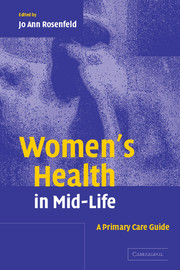Book contents
- Frontmatter
- Contents
- List of contributors
- 1 Introduction
- Part I Health promotion
- Part II Hormonal changes
- 8 Physical changes in menopause and perimenopause
- 9 Spiritual and psychological aspects of menopause
- 10 Hormone therapy
- 11 Contraception and fertility
- Part III Disease prevention
- Part IV Cancer prevention
- Index
- References
9 - Spiritual and psychological aspects of menopause
from Part II - Hormonal changes
Published online by Cambridge University Press: 21 August 2009
- Frontmatter
- Contents
- List of contributors
- 1 Introduction
- Part I Health promotion
- Part II Hormonal changes
- 8 Physical changes in menopause and perimenopause
- 9 Spiritual and psychological aspects of menopause
- 10 Hormone therapy
- 11 Contraception and fertility
- Part III Disease prevention
- Part IV Cancer prevention
- Index
- References
Summary
Introduction
Case: Anne was 48 when she found out that she had breast cancer. She had been having frequent hot flushes, having stopped having periods one year ago, and she was still dealing with the fact that her children were no longer living at home. One child was in college and one was getting married, and now she was faced with the news that she had breast cancer. Cancer! It was almost too much to bear. She wrestled with thoughts of her changed body image, the upcoming loss of her breast, and the thought of “not being a woman any more.”
Her doctor was asking her to make decisions that she did not feel ready to make, no matter how many times he explained the choices. How extensive did the surgery need to be? Should she get a complete mastectomy or a more breast-sparing procedure? Should she proceed with plastic surgery to reconstruct her breast, or was she being selfish? Where could she turn for help with these decisions? In addition to talking with her husband and reading as much as she could, she turned to spiritual resources for strength. She found great comfort in returning to religious practices that formerly she had not considered so important, like prayer and attendance at religious services. While she considered medical knowledge and skill most important in a physician, she sought a doctor who would understand her need to consult with God throughout the decision-making process.
Keywords
- Type
- Chapter
- Information
- Women's Health in Mid-LifeA Primary Care Guide, pp. 137 - 150Publisher: Cambridge University PressPrint publication year: 2004

